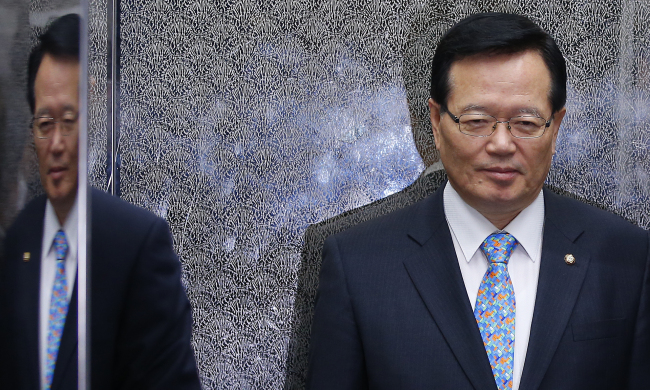Parliamentary Speaker Chung Ui-hwa offered a compromise version of the National Assembly Advancement Act revision, seeking to bridge the ruling conservative party’s move for drastic changes and the main opposition camp’s backlash against it.
While parties continued to lock horns over the issue, the Constitutional Court held an open hearing to debate the legitimacy of the contended procedural bill.
 |
| (Yonhap) |
Chung’s bill was signed by 14 other lawmakers and submitted to the secretariat on Thursday afternoon.
The key point of the bill is to activate a fast track system. Parties may, on a majority vote, demand that a specific urgent issue be prioritized, in which case the corresponding bill will be put to a full floor vote after 75 days.
The current law adopts more stringent prerequisites ― a three-fifths quorum and a 330-day evaluation period before submission.
Signatories to Chung’s bill included Reps. Lee Jae-oh, Yoo Seong-min and Chung Doo-un of the ruling Saenuri Party, as well as independent Reps. Kim Dong-cheol and Hwang Ju-hong.
The Saenuri Party, which is after a more extensive revision of the advancement bill, showed some resistance to Chung’s moderate alteration but said that it will embrace the plan as long as The Minjoo Party of Korea consents to it.
“We have been trying to reach a compromise between Speaker Chung’s arbitration plan and the party’s stance,” floor leader Rep. Won Yoo-chul told reporters Thursday.
Won had come under fire the previous day for sending out text messages to party members to “refrain from signing Chung’s bill” until further notice.
A preferable scenario for the ruling party is to adopt an earlier revision bill drafted by Rep. Kweon Seong-dong, stating that the parliamentary speaker may put a bill to vote upon the majority consent of the floor, even in the absence of natural disasters or state emergency situations.
Won’s opposition counterpart Rep. Lee Jong-kul, however, claimed that the party would accept neither Kweon’s extensive plan nor Chung’s compromising one.
The much-disputed parliamentary act, involving a higher decision-making quorum and increased restrictions on the parliamentary speaker’s autonomy, was introduced back in 2012 as a joint effort to root out the frequent violent incidents in the house.
As a result, even the majority party has since been unable to force ahead with a bill unless it secures at least 180 seats in the 300-seat assembly.
Amid ongoing bipartisan feuds, the Constitutional Court held an open hearing on the legitimacy of the advancement bill, responding to an earlier petition filed by some Saenuri lawmakers.
Rep. Joo Ho-young and 18 other party members had petitioned the top court to review the bill, claiming that the reinforced quorum violates the democratic rule of majority.
By Bae Hyun-jung (tellme@heraldcorp.com)

